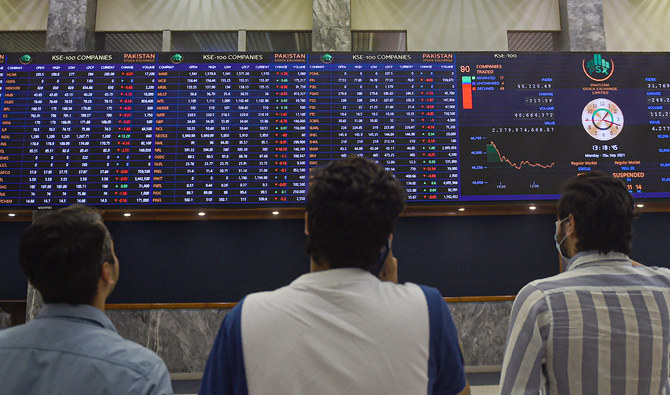KARACHI: Pakistan’s currency and stocks closed lower on Tuesday amid the uncertain outcome of over a month-long negotiations between Pakistani authorities and the International Monetary Fund for the release of a $1 billion tranche of a bailout package.
The three-year, $6 billion package, approved in 2019, was aimed at shoring up fragile public finances and strengthening a slowing economy. Negotiations for the release of the latest tranche started in the first week of October in Washington.
Five reviews of the program had been completed by March. The sixth is pending since June this year, which, if completed, will enable Pakistan to receive around $1 billion from the fund.
In the meantime, the Pakistan’s currency has remained under pressure in recent weeks due to rising import bills and the ongoing IMF talks.
On Tuesday, the rupee closed at Rs 71.63, losing 0.65 percent value against the United States dollar (USD). The currency had appreciated following Saudi Arabia’s announcement late last month of $3 billion to support Pakistan's foreign reserves, as well as $1.2 billion in financing for the oil derivatives trade during the year.
The benchmark KSE 100 index also shed 715 points on Tuesday to close at the 46399.91 level due to concerns about rupee depreciation and delays in the outcome of IMF talks.
“Delays in release of IMF tranche amid ongoing IMF review, and foreign outflows played a catalyst role in bearish close,” Ahsan Mehanti, chief executive at Arif Habib Corporation, told Arab News. “Stocks closed sharply lower post earnings season profit taking on concerns for slump in rupee parity and reports of likely surge in taxes and removal of subsidies on resumption of IMF program.”
However, analysts also said the outcome of talks with the IMF, expected any day now, would provide a cushion to the unstable currency.
“The major uncertainty is related to the IMF talks, which is keeping the Pakistan rupee under pressure. If the IMF announces the outcome of talks which is expected within a couple of days it would arrest the rupee fall,” Abdul Azeem, head of research at Spectrum Securities, said.
The currency also depreciated in the free market where it was trading at Rs173.80 for buying and Rs174.80 for selling as compared to Rs172 for buying and Rs173 for selling on Monday.
However, currency traders said their transaction volume had halved due to strict conditions imposed by regulators and investigations into foreign currency purchases.
“Our trade volume has declined by 50 percent as people fear being questioned by security agencies and are thus staying away from the market”, Malik Bostan, chairman of the Exchange Companies Association of Pakistan, told Arab News. “The agency [Federal Investigation Agency] summons people to its offices to take data from exchange companies. This practice is keeping people away from exchange companies and impacting their business.”
The rupee is also facing pressure due to the increasing demand for import payments.
Pakistan’s imports during Jul-Oct 2021 increased by 64% to $24.99 billion compared to $15.19 billion during Jul-Oct 2020.
















